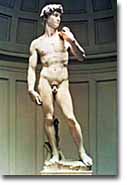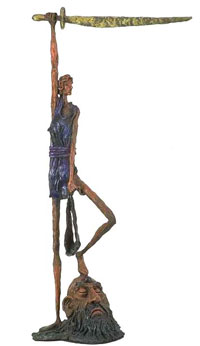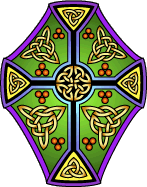 Homily Blog will return August 7 when Michael & Barbara are back from Britain.
Homily Blog will return August 7 when Michael & Barbara are back from Britain.St. Non's Retreat Centre, St. Davids, Pembrokeshire
Ideas for Sunday's Homily- Please feel free to join in
 I've included for Sunday's reading the portion about Uzzah being struck down because it seems crucial to the chapter's theme of the profane and the Holy.
I've included for Sunday's reading the portion about Uzzah being struck down because it seems crucial to the chapter's theme of the profane and the Holy.6 When they came to the threshing floor of Nacon, Uzzah reached out and took hold of the ark of God, because the oxen stumbled. 7 The LORD's anger burned against Uzzah because of his irreverent act; therefore God struck him down and he died there beside the ark of God.
8 Then David was angry because the LORD's wrath had broken out against Uzzah, and to this day that place is called Perez Uzzah. [e]
9 David was afraid of the LORD that day and said, "How can the ark of the LORD ever come to me?" 10 He was not willing to take the ark of the LORD to be with him in the City of David. Instead, he took it aside to the house of Obed-Edom the Gittite. 11 The ark of the LORD remained in the house of Obed-Edom the Gittite for three months, and the LORD blessed him and his entire household.
12 Now King David was told, "The LORD has blessed the household of Obed-Edom and everything he has, because of the ark of God." So David went down and brought up the ark of God from the house of Obed-Edom to the City of David with rejoicing. 13 When those who were carrying the ark of the LORD had taken six steps, he sacrificed a bull and a fattened calf. 14 David, wearing a linen ephod, danced before the LORD with all his might, 15 while he and the entire house of Israel brought up the ark of the LORD with shouts and the sound of trumpets.
16 As the ark of the LORD was entering the City of David, Michal daughter of Saul watched from a window. And when she saw King David leaping and dancing before the LORD, she despised him in her heart.
17 They brought the ark of the LORD and set it in its place inside the tent that David had pitched for it, and David sacrificed burnt offerings and fellowship offerings [f] before the LORD. 18 After he had finished sacrificing the burnt offerings and fellowship offerings, he blessed the people in the name of the LORD Almighty. 19 Then he gave a loaf of bread, a cake of dates and a cake of raisins to each person in the whole crowd of Israelites, both men and women. And all the people went to their homes.
20 When David returned home to bless his household, Michal daughter of Saul came out to meet him and said, "How the king of Israel has distinguished himself today, disrobing in the sight of the slave girls of his servants as any vulgar fellow would!"
21 David said to Michal, "It was before the LORD, who chose me rather than your father or anyone from his house when he appointed me ruler over the LORD's people Israel—I will celebrate before the LORD. 22 I will become even more undignified than this, and I will be humiliated in my own eyes. But by these slave girls you spoke of, I will be held in honor."
23 And Michal daughter of Saul had no children to the day of her death.
Footnotes:
 After Saul's death there was a bitter civil war among the tribes of Israel. The king was dead, but the remnants of his army opposed David. The following passage records the reconciliation between the two armies and the begining of David's reign in Jerusalem.
After Saul's death there was a bitter civil war among the tribes of Israel. The king was dead, but the remnants of his army opposed David. The following passage records the reconciliation between the two armies and the begining of David's reign in Jerusalem.All the tribes of Israel came to David at Hebron, and said, "Look, we are your bone and flesh. For some time, while Saul was king over us, it was you who led out Israel and brought it in. The LORD said to you: It is you who shall be shepherd of my people Israel, you who shall be ruler over Israel." So all the elders of Israel came to the king at Hebron; and King David made a covenant with them at Hebron before the LORD, and they anointed David king over Israel. David was thirty years old when he began to reign, and he reigned forty years. At Hebron he reigned over Judah seven years and six months; and at Jerusalem he reigned over all Israel and Judah thirty-three years.
David occupied the stronghold, and named it the city of David. David built the city all around from the Millo inward. And David became greater and greater, for the LORD, the God of hosts, was with him.
 Saul, who has repeatedly tried to kill David, has been slain in battle by the Philistines. David, hearing of the king's death, makes the following lament. What do you make of it?
Saul, who has repeatedly tried to kill David, has been slain in battle by the Philistines. David, hearing of the king's death, makes the following lament. What do you make of it?After the death of Saul, when David had returned from defeating the Amalekites, David remained two days in Ziklag.
David intoned this lamentation over Saul and his son Jonathan. (He ordered that The Song of the Bow be taught to the people of Judah; it is written in the Book of Jashar.) He said:
 This Sunday we have the vivid story of David and Goliath, continuing the theme that God often surprises us by using the small, the overlooked or underused to do big work on the earth. It's an interesting text to contemplate the week after our church has elected the first woman as Presiding Bishop in the Anglican Communion.
This Sunday we have the vivid story of David and Goliath, continuing the theme that God often surprises us by using the small, the overlooked or underused to do big work on the earth. It's an interesting text to contemplate the week after our church has elected the first woman as Presiding Bishop in the Anglican Communion. The Anointing of David, Bute
The Anointing of David, ButeSamuel went to Ramah; and Saul went up to his house in Gibeah of Saul. Samuel did not see Saul again until the day of his death, but Samuel grieved over Saul. And the LORD was sorry that he had made Saul king over Israel.
The Lord said to Samuel, "How long will you grieve over Saul? I have rejected him from being king over Israel. Fill your horn with oil and set out; I will send you to Jesse the Bethlehemite, for I have provided for myself a king among his sons." Samuel said, "How can I go? If Saul hears of it, he will kill me." And the Lord said, "Take a heifer with you, and say, `I have come to sacrifice to the Lord.' Invite Jesse to the sacrifice, and I will show you what you shall do; and you shall anoint for me the one whom I name to you." Samuel did what the Lord commanded, and came to Bethlehem. The elders of the city came to meet him trembling, and said, "Do you come peaceably?" He said, "Peaceably; I have come to sacrifice to the Lord; sanctify yourselves and come with me to the sacrifice." And he sanctified Jesse and his sons and invited them to the sacrifice.
 Sunday is Trinity Sunday, and the lectionary gives us an interesting lesson from Exodus to consider. What do you find in it to enrich your understanding of Trinity?
Sunday is Trinity Sunday, and the lectionary gives us an interesting lesson from Exodus to consider. What do you find in it to enrich your understanding of Trinity?Moses was keeping the flock of his father-in-law Jethro, the priest of Midian; he led his flock beyond the wilderness, and came to Horeb, the mountain of God. There the angel of the LORD appeared to him in a flame of fire out of a bush; he looked, and the bush was blazing, yet it was not consumed. Then Moses said, "I must turn aside and look at this great sight, and see why the bush is not burned up." When the LORD saw that he had turned aside to see, God called to him out of the bush, "Moses, Moses!" And he said, "Here I am." Then he said, "Come no closer! Remove the sandals from your feet, for the place on which you are standing is holy ground." He said further, "I am the God of your father, the God of Abraham, the God of Isaac, and the God of Jacob." And Moses hid his face, for he was afraid to look at God.
Artwork by Cari Buziak Sunday is Pentecost, the coming of the Spirit. If you could ask God any question about that day, about what that experience was for the first disciples and the people around them, what would it be?
Sunday is Pentecost, the coming of the Spirit. If you could ask God any question about that day, about what that experience was for the first disciples and the people around them, what would it be?When the day of Pentecost had come, the disciples were all together in one place. And suddenly from heaven there came a sound like the rush of a violent wind, and it filled the entire house where they were sitting. Divided tongues, as of fire, appeared among them, and a tongue rested on each of them. All of them were filled with the Holy Spirit and began to speak in other languages, as the Spirit gave them ability.
Now there were devout Jews from every nation under heaven living in Jerusalem. And at this sound the crowd gathered and was bewildered, because each one heard them speaking in the native language of each. Amazed and astonished, they asked, "Are not all these who are speaking Galileans? And how is it that we hear, each of us, in our own native language? Parthians, Medes, Elamites, and residents of Mesopotamia, Judea and Cappadocia, Pontus and Asia, Phrygia and Pamphylia, Egypt and the parts of Libya belonging to Cyrene, and visitors from Rome, both Jews and proselytes, Cretans and Arabs-- in our own languages we hear them speaking about God's deeds of power."
When it was evening on that day, the first day of the week, and the doors of the house where the disciples had met were locked for fear of the Jews, Jesus came and stood among them and said, "Peace be with you." After he said this, he showed them his hands and his side. Then the disciples rejoiced when they saw the Lord. Jesus said to them again, "Peace be with you. As the Father has sent me, so I send you." When he had said this, he breathed on them and said to them, "Receive the Holy Spirit. If you forgive the sins of any, they are forgiven them; if you retain the sins of any, they are retained."

Jesus prayed for his disciples, saying, "Holy Father, protect them in your name that you have given me, so that they may be one, as we are one. While I was with them, I protected them in your name that you have given me. I guarded them, and not one of them was lost except the one destined to be lost, so that the scripture might be fulfilled. But now I am coming to you, and I speak these things in the world so that they may have my joy made complete in themselves. I have given them your word, and the world has hated them because they do not belong to the world, just as I do not belong to the world. I am not asking you to take them out of the world, but I ask you to protect them from the evil one. They do not belong to the world, just as I do not belong to the world. Sanctify them in the truth; your word is truth. As you have sent me into the world, so I have sent them into the world. And for their sakes I sanctify myself, so that they also may be sanctified in truth."